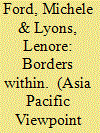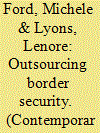|
|
|
Sort Order |
|
|
|
Items / Page
|
|
|
|
|
|
|
| Srl | Item |
| 1 |
ID:
072726


|
|
|
|
|
| Publication |
2006.
|
| Summary/Abstract |
The border studies literature makes a strong case against claims for unfettered transnationalism and 'borderlessness' in our 'globalising world'. However, its focus on movement across borders means that it fails to address bordering practices that occur within the nation-state as a result of transnational activity. In this paper, we extend Cunningham and Heyman's concepts 'enclosure' and 'mobility' to confront the different layers of bordering (both physical and non-physical) that have occurred in Indonesia's Riau Islands since they became part of the Indonesia-Malaysia-Singapore Growth Triangle.
|
|
|
|
|
|
|
|
|
|
|
|
|
|
|
|
| 2 |
ID:
121879


|
|
|
|
|
| Publication |
2013.
|
| Summary/Abstract |
Since the signing of the United Nations Convention against Trans-national Organized Crime, the Straits of Malacca have been identified as a "hot spot" for whole range of maritime security threats, including human trafficking and people smuggling. As a consequence, Indonesia's national and local authorities have been under immense pressure from the international community to develop and implement programmes that address these concerns. Multilateral agencies and other donor organizations have also pumped millions of dollars into counter-trafficking and anti-smuggling programmes in the Riau Islands. Much of the groundwork for both government and international initiatives is done by NGOs, most of which work to identify and assist repatriated migrant workers or victims of trafficking. In one case, however, a Batam-based NGO has gone far beyond this well-trodden path, developing a system to apprehend undocumented labour migrants who use the services of people smugglers to return to Indonesia without passing through immigration. This article examines the case of Gerakan Anti-Trafficking (Anti-Trafficking Movement, GAT) and its implications for our understanding of emerging modes of non-state involvement in border regulation.
|
|
|
|
|
|
|
|
|
|
|
|
|
|
|
|
| 3 |
ID:
087034


|
|
|
|
|
| Publication |
2009.
|
| Summary/Abstract |
In the last five years, interest among civil society actors in the issues migrant domestic workers face in Singapore has exploded. Nongovernmental organizations (NGOs), informal networks, and faith-based groups have all formed to address the needs and interests of these workers. Most of these organizations are welfare-oriented, providing support services, training programs, and social networking opportunities. Some engage in advocacy and research activities. This latter group has lobbied successfully for important changes in how female migrant workers are recruited into and deployed within the domestic labor market. To date, their activities have been focused at the local level through their engagements with the Singaporean government, employment agencies, and employers. This orientation, however, has recently begun to change as they seek to develop transnational networks and support regional and international campaigns. This article examines the reasons behind this interest in cross-border organizing through detailed case studies of two advocacy-oriented NGOs, Transient Workers Count Too and the Humanitarian Organisation for Migration Economics. The article explains that although a "transnational imperative" has begun to shape the activities of these two NGOs, they have different motivations for engaging beyond the border. By revealing a diversity of forms and meanings associated with the processes of "scaling up," this article contributes to the broader scholarly understanding of the complex nature of transnational organizing and challenges earlier studies that assert that transnational activism is a necessary and natural outcome of migrant worker organizing.
|
|
|
|
|
|
|
|
|
|
|
|
|
|
|
|
|
|
|
|
|